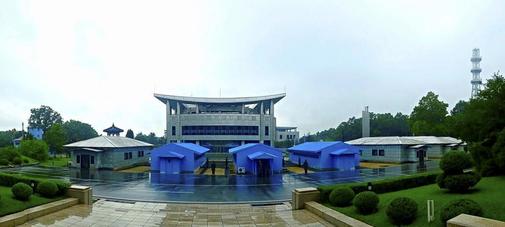In August 1945, shortly before the surrender of Japan, Colonels Rusk and Bonesteel, of the US Army, were commissioned to establish an intermediate point on the Korean peninsula so that their bosses would meet their USSR allies and They will stage the end of World War II in the region. It took half an hour to choose the 38th parallel and thereby sealed the fate of this old Asian kingdom in modern times.
After the invasion of the northern communists in 1950, the subsequent counterattack of the UN forces led by MacArthur, the entry into war of Mao's China and the withdrawal of the blue helmets south of the 38th parallel, on July 27 from 1953 the ceasefire was reached. Each contestant delayed his lines 2,000 meters, a line of military demarcation was set and thus was born, along 238 kilometers, the Korean Demilitarized Zone (ZDC).
In this strip not only military activity is prohibited, but there is practically no more civilian population than the 200 inhabitants of Daeseong-dong village. The result is that 66 years later this strip has become a natural reserve with a great ecological diversity. 50 animal and 12 plant species that are threatened or endangered and have been developed here without human pressure have been counted. The Korean wild cat, the red-crowned crane or the Amur leopard are some of the most prominent species.
Paradoxically, the progress of the peace process between the two Koreas is the greatest threat to this ecological paradise that emerged on the last open front of the Cold War. Kim Seung-ho, director of the Ecological Research Institute of the ZDC, openly acknowledged it to South Korean public radio: "Once the military tension disappears, what will naturally follow is that people will strongly feel the need to transform the area ... It is a sad reality that we have preserved this area because we could die if we entered it and not because of the ethical sense of taking care of nature. "
This is how the tension between man and the environment, which we appreciate every day in the debates we have about pollution and global warming, will replace the ideological clash between capitalism and communism that served as an excuse for the Cold War. Nothing like this inter-Korean border, demilitarized but also dehumanized to the extreme, illustrates the unweighted dominance of our species on the planet. A species with no known predator, except man himself.
According to the criteria of The Trust Project
Know more- Un
- WWII
- Japan
- China
- Climate change
- Columnists
Hiroshima Tribune: genocide or war action?
G7 Summit Donald Trump's third G7: from bad to worse
GrandstandThe irresistible proliferation of air conditioning

